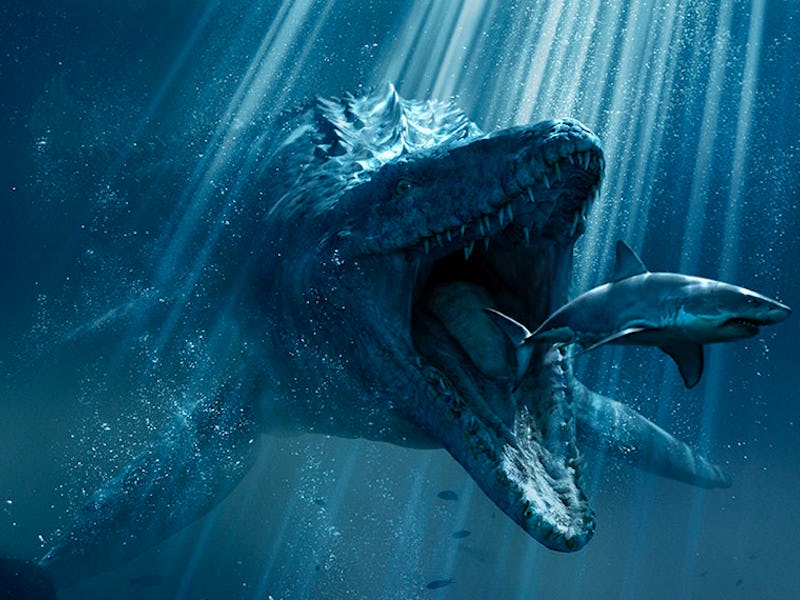Here's How Jurassic World Could Plausibly Feed Its Mosasaurus
Great white sharks for breakfast, lunch, and dinner

If you live in New York City you’ve undoubtedly seen the ubiquitous advertising for the upcoming blockbuster four-quel Jurassic World lining the walls at your local subway stop. One poster features the oh-so-dreamy Chris Pratt and his merry band of trained Velociraptors riding dirty, most likely about to mess with the movie’s newest bad dino, the hilariously named Indominous Rex. The other, seen above, depicts a massive Mosasaurus about to devour a great white shark for an afternoon snack.
The second ad is a clever nod to Steven Spielberg, who got his start by directing an obscure arthouse trinket called Jaws and who kicked off this series by directing the original JP 22 years ago. The ad got us thinking. What would it take for a real-life Jurassic World to regularly feed great white sharks to its hangry mosasaur?
Let’s break it down.
Mosasaurs were underwater kings when they prowled oceans more than 65 million years ago, the seagoing equivalent of T-rexes, apex predators able to eat basically whatever they pleased. They were about 49 to 59 feet long, and could weigh up to 15 tons — 30,000 pounds, roughly the same as 10 Priuses.
They’re perfect creatures to add to the Jurassic World roster: their agility and ferocity mirrors that of modern predatory fish, such as great whites. But the impression we get from the ads is of a creature most similar perhaps to the contemporary killer whale, another apex predator regularly kept in captivity.
Full-grown male killer whales grow to about 20 feet long, a substantial 37 feet shorter than mosasaurs. But orcas do bring heft. The largest male orca ever recorded was 11 tons (roughly 22,000 pounds), in the same ballpark of a smallish mosasaur. Killer whales need to eat about 150 to 300 pounds of food per day. In captivity, they’re fed a steady diet of fish.
So if we presume the small mosasaur at Jurassic World is at least an orca-sized 11 tons, he’d have to eat maybe 300 pounds of fish per day. Great whites typically weigh up to 5,000 pounds, a meal that would sate the mosasaur for two weeks, ballpark.
In such a case, Jurassic World’s mosasaur would be good and fed. What, then, would it cost the park to keep a stock of great whites alive? George H. Burgess, the director of the Florida Program for Shark Research at the Florida Museum of Natural History (who has a particularly awesome staff photo here), told me it’d be difficult to know for sure. “Only a couple of young great whites have been kept in captivity, and only then for a couple of weeks,” he said. Gauging those sharks' diets is tough. “Whites like other sharks are opportunistic feeders eating while the going is good and often having dry spells in between meals,” he said. He calls this “paycheck-to-paycheck feeding.”
Keeping predatory sharks in an aquarium is tricky. (Whale sharks, for their 20 tons of radness, mostly graze on plankton.) Rachel Munson, an aquarist at the Aquarium of the Pacific in Long Beach, California, told me the largest shark they have is a Sand Tiger Shark, which at a relatively minuscule 172 pounds eats about 10 pounds of food per week and can grow up to 10.5 feet long.
Based on that data, 29 sand tiger sharks would roughly equal 1 great white, and the 10 pounds a single sand tiger shark eats per week turns into 290 pounds of food per week for the great white. That works out to 1,160 pounds of fish per month for Jurassic World to feed to the great white that they're going to turn around and dangle down the maw of a mosasaur once every couple of weeks.
Is it plausible? For a mosasaur to sustain itself on a diet of great whites turns out somewhat reasonable, assuming the park could successfully keep the sharks in steady supply. Dumping a ton of fish every month into an animal you're simply going to dangle in front of a mosasaur sounds extravagant. Then again, if you’re the exceedingly rich boneheads behind Jurassic World, sound decision-making isn't exactly your strongest attribute. Responsible, scrupulous park management makes for a great vacation but not such an entertaining dinosaur-catastrophe movie.